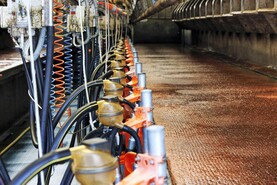While Chinese processors appear to have demand problems, Irish processors continue to be under pressure on milk supply. Latest CSO data to the end of the June show that milk deliveries to processors are running 5.3%, or 243m litres behind what was delivered in the first six months of last year.
While we have written at length previously on these pages about the problems the sector faces with too much processing capacity chasing too little milk – higher fixed costs hitting the bottom line, reduced cash flows and job losses – the longer the challenges persist, the more likely they are to do permanent damage to the sector.
In any industry periods of reduced output or excess capacity generally lead either to a round of consolidation either through mergers and acquisitions or a drop in capacity due to the failure of weaker companies.
While the Irish processing sector is in many ways like any other industry group, it also has several quirks which could mean it is slower to follow the usual path. The co-op model is one where the farmers supplying their processor also own the processor.
This means they supply their co-op and are not willing – or even able in many cases – to supply anyone else. For the co-ops this mean that their supply is at risk from the usual ups and downs caused by weather and regulation issues, but generally do not face a cliff-edge risk from all their suppliers upping sticks and switching to another processor.
In the case of Kerry Dairy Ireland, which is not a co-op but rather a division of a global food group, the cracks are starting to appear with the Munster Dairy Producer Organisation (MDPO) recently formed by suppliers who feel they need to act separately of the company to protect their interests. Even there, the MDPO has made clear that it would be happy to continue to supply Kerry if a satisfactory milk price can be agreed.
From the processor side capacity issues could be addressed by attracting new suppliers.
Encourage
There are ICOS rules on that which make it almost impossible for co-ops to encourage suppliers to switch processors, but a need for milk could mean that larger operations may be more tempted to take over smaller ones – with a view to getting their hands on the milk, but probably with little interest in whatever processing capacity comes as part of the deal.
In the meantime, there remains a small silver lining for processors – the reduced milk supply means they are in a position to concentrate on using the milk they have to manufacture higher value products and reduce the amount of commodity product (such as skim milk powder) they make across the peak months of April, May and June.






 This is a subscriber-only article
This is a subscriber-only article










SHARING OPTIONS: